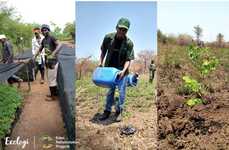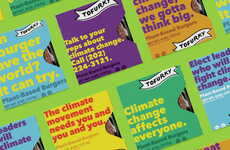
Environmentalists Say Octuplets' Carbon Footprints Aren't Tiny
Katie Cordrey — February 6, 2009 — Eco
References: huffingtonpost & motherjones
24.8 Million tons of CO2 will be added to the earth over the lifetimes of the octuplets born to Nadya Suleman on the 29th of January. Add another 18.6 million tons for the family of six she already had and you come up with a whopping 43.4 million tons of CO2 directly attributable to one person’s offspring.
The impact doesn’t stop there if you consider that many of these octuplets are likely to reproduce in numbers greater than their own ‘replacement’ value of one.
Suleman felt that she wanted more than six children because she was lonely as an only child. She was able to get help getting pregnant with octuplets from a fertility clinic. After reading as well as watching excerpts from an interview of Suleman, I am left dumbfounded and angry, but I’ll not indulge in a rant. Instead, let me cite the empirical impact of population on the health of the planet.
According to Mother Jones Magazine, over his/her lifetime, each American born in the 1990s (the numbers are likely higher now) will produce an average of:
3.1 million pounds of CO2 (same as 413 plane trips from New York to Tokyo)
22,828,508 pounds of water waste (the equivalent of 48,060 ten-minute showers)
16,372 pounds of yard waste (enough to fill 442 large garbage cans)
7,249 pounds of food waste (as much as 16 households produce in a year
S/he will eat 1,654 chickens, 74 turkeys, 25 pigs, 11 cows, 2 sheep, and 18,675 eggs.
And s/he will use 1,870 barrels of petroleum (enough to fuel a Subaru Outback for 822,800 miles).
Suleman says that she plans to go back to school to complete Master’s studies in counseling and that she’ll be taking advantage of the school’s daycare facilities to take care of her octuplets. I wonder how many other women won’t be able to go to school because Suleman’s octuplets are using a disproportionate percentage of available childcare services.
Some believe that large families such as these should not be of concern to the rest of the population. Others (like me) see their actions as irresponsible self-indulgence akin to eco-terrorism.
What do you think?
The impact doesn’t stop there if you consider that many of these octuplets are likely to reproduce in numbers greater than their own ‘replacement’ value of one.
Suleman felt that she wanted more than six children because she was lonely as an only child. She was able to get help getting pregnant with octuplets from a fertility clinic. After reading as well as watching excerpts from an interview of Suleman, I am left dumbfounded and angry, but I’ll not indulge in a rant. Instead, let me cite the empirical impact of population on the health of the planet.
According to Mother Jones Magazine, over his/her lifetime, each American born in the 1990s (the numbers are likely higher now) will produce an average of:
3.1 million pounds of CO2 (same as 413 plane trips from New York to Tokyo)
22,828,508 pounds of water waste (the equivalent of 48,060 ten-minute showers)
16,372 pounds of yard waste (enough to fill 442 large garbage cans)
7,249 pounds of food waste (as much as 16 households produce in a year
S/he will eat 1,654 chickens, 74 turkeys, 25 pigs, 11 cows, 2 sheep, and 18,675 eggs.
And s/he will use 1,870 barrels of petroleum (enough to fuel a Subaru Outback for 822,800 miles).
Suleman says that she plans to go back to school to complete Master’s studies in counseling and that she’ll be taking advantage of the school’s daycare facilities to take care of her octuplets. I wonder how many other women won’t be able to go to school because Suleman’s octuplets are using a disproportionate percentage of available childcare services.
Some believe that large families such as these should not be of concern to the rest of the population. Others (like me) see their actions as irresponsible self-indulgence akin to eco-terrorism.
What do you think?
Trend Themes
1. Rising Environmental Impact - The increasing carbon footprints of large families are raising concerns about the environmental impact of population growth.
2. Demand for Sustainable Parenting - There is a growing demand for eco-friendly parenting practices that minimize carbon emissions and waste.
3. Childcare Resource Strain - The disproportionate use of available childcare services by large families is creating challenges for other parents seeking access to these resources.
Industry Implications
1. Sustainable Parenting Products - Manufacturers of eco-friendly baby products have an opportunity to cater to the rising demand for sustainable parenting practices.
2. Green Education Services - Providers of eco-focused educational programs can help parents and children adopt more environmentally conscious behaviors for a sustainable future.
3. Childcare Service Innovation - Companies that offer innovative solutions for efficient and equitable distribution of childcare resources can address the strain caused by large families.
3.9
Score
Popularity
Activity
Freshness















